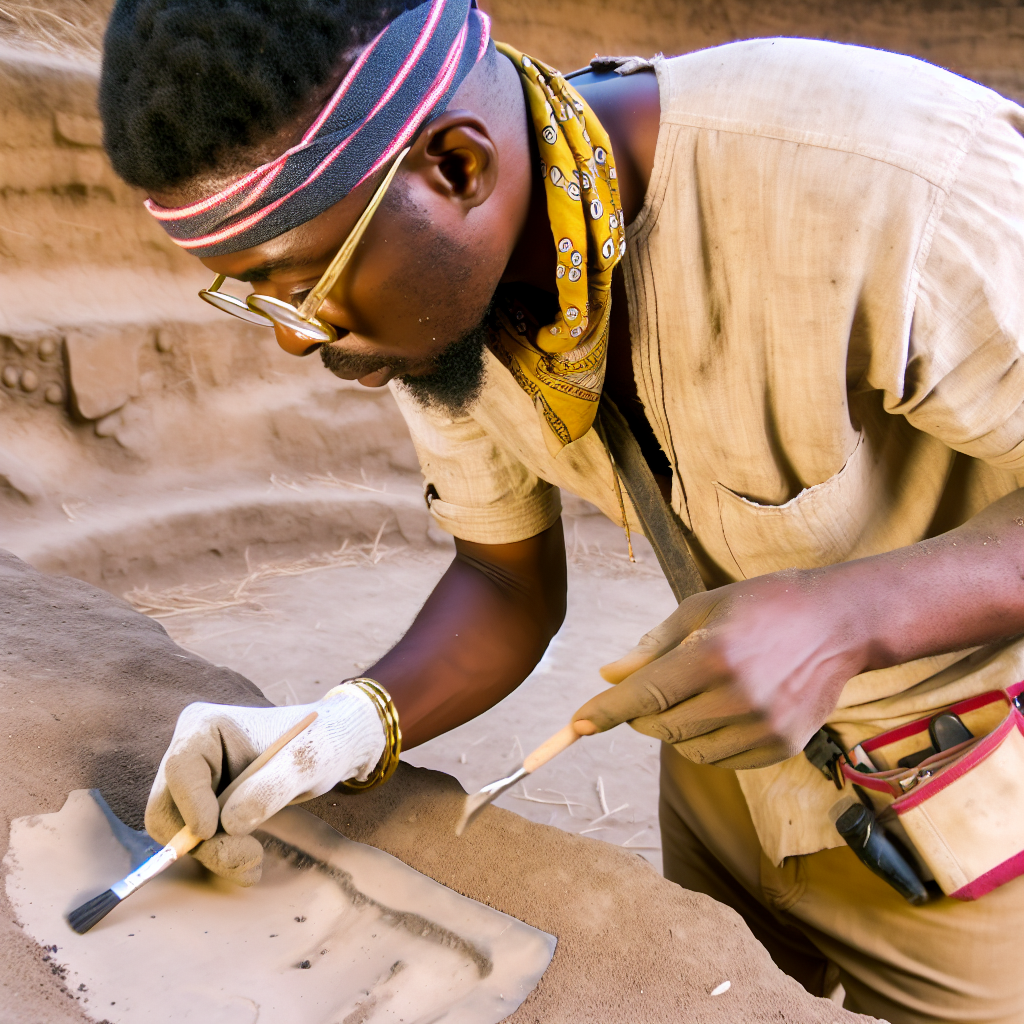Introduction
Exploring the preservation challenges of Nigerian archaeological sites is crucial for safeguarding these historical treasures.
Preserving these sites ensures that future generations can appreciate and learn from Nigeria’s rich cultural heritage.
Nigerian archaeological sites hold immense historical and cultural significance, providing valuable insights into the country’s past civilizations.
Inadequate Funding
One of the major challenges facing the preservation of archaeological sites in Nigeria is the lack of adequate funding.
This issue has significant implications for the protection and maintenance of these important cultural heritage sites.
- Firstly, the Nigerian government allocates limited resources to the preservation and maintenance of archaeological sites.
- This lack of funding results in the neglect of critical conservation efforts and jeopardizes the long-term sustainability of these sites.
For example, the UNESCO World Heritage Site of Sukur Cultural Landscape in Adamawa State has suffered from insufficient funding for conservation projects.
Similarly, the Osun-Osogbo Sacred Grove in Osun State has struggled to maintain its historical significance due to a lack of financial resources.
Effects of Limited Funding
Furthermore, the impact of limited funding on conservation efforts and site management cannot be overstated.
Without adequate financial resources, archaeological sites in Nigeria are at risk of degradation, vandalism, and encroachment.
- Conservation projects, such as stabilization of structures, removal of invasive vegetation, and implementation of visitor management strategies, are often hindered by insufficient funding.
- Site management activities, including monitoring, maintenance, and security, are compromised when resources are scarce, leading to increased vulnerabilities for these archaeological sites.
The preservation challenges of Nigerian archaeological sites are exacerbated by the lack of funding allocated to their conservation and maintenance.
It is imperative for the government and relevant stakeholders to prioritize financial resources for the protection of these valuable cultural heritage sites to ensure their longevity for future generations.
Lack of awareness
Address the low level of awareness among the general public about the importance of preserving archaeological sites.
Discuss the need for educational campaigns and outreach programs to raise awareness about the significance of these sites.
Highlight the impact of lack of awareness on the deterioration of Nigerian archaeological sites.
Challenges of Lack of Awareness on Nigerian Archaeological Sites
Preservation challenges faced by Nigerian archaeological sites are compounded by the low level of awareness among the general public regarding the significance of these sites.
Many people in Nigeria are unaware of the cultural and historical value that these archaeological sites hold.
Without a proper understanding of the importance of preserving archaeological sites, there is a lack of support for conservation efforts.
This leads to neglect and deterioration of these sites over time.
Addressing the Low Awareness Levels
One of the key ways to address the issue of low awareness is through educational campaigns and outreach programs.
These initiatives can help educate the public about the rich history and cultural heritage that Nigerian archaeological sites represent.
By raising awareness about the importance of preserving these sites, more people can become advocates for their protection.
This, in turn, can lead to increased efforts to conserve and maintain these valuable historical landmarks.
Impact of Lack of Awareness on Deterioration
The lack of awareness about the significance of Nigerian archaeological sites has a direct impact on their deterioration.
Without proper understanding and support for preservation efforts, these sites are left vulnerable to neglect, vandalism, and natural decay.
As a result, many of Nigeria’s archaeological sites are at risk of being lost forever.
The cultural and historical treasures that these sites hold are irreplaceable.
This makes it crucial to raise awareness and take active steps to protect them.
Preserving Nigeria’s Cultural Heritage
The preservation challenges faced by Nigerian archaeological sites are exacerbated by the low level of awareness among the general public.
Educating people about the importance of these sites is essential to ensuring their protection and conservation for future generations.
Through educational campaigns and outreach programs, we can work towards increasing awareness and appreciation for Nigerian archaeological sites.
This will ultimately safeguard these valuable pieces of our cultural heritage.
Discover More: Important Publications in Nigerian Agricultural Economics
In Nigeria, archaeological sites face significant challenges due to illegal activities such as looting and vandalism.
These detrimental actions pose a threat to the preservation of the country’s rich cultural heritage.
Effects of Illegal Activities on Archaeological Sites
- Looting results in the loss of valuable artifacts, depriving future generations of their heritage.
- Vandalism causes irreversible damage to archaeological structures and ruins, diminishing their historical significance.
- Illegal activities disrupt the scientific study and research that can provide insights into Nigeria’s past.
Solutions to Combat Illegal Activities
- Increased surveillance and security measures at archaeological sites to deter looters and vandals.
- Collaboration with local communities to raise awareness about the importance of preserving cultural heritage.
- Implementing stricter laws and harsher penalties for those found guilty of looting or vandalizing archaeological sites.
- Creating a database of stolen artifacts to facilitate their recovery and return to the rightful owners.
- Encouraging responsible tourism that promotes respect for archaeological sites and their preservation.
Preserving Nigeria’s archaeological sites is crucial not only for the country’s cultural heritage but also for the understanding of its history and identity.
By addressing illegal activities through a combination of enforcement, education, and community engagement, we can safeguard these valuable sites for future generations to appreciate and learn from.
Uncover the Details: Fieldwork Essentials for Nigerian Geophysicists
Inadequate Infrastructure
Analyze the challenges posed by poor infrastructure at archaeological sites.
Challenges include lack of proper signage, fencing, and security measures.
Discuss the implications of inadequate infrastructure on the safety and preservation of these sites.
Transform Your Career with Expert Guidance
Get personalized mentorship consulting that’s tailored to your unique path. Our expert advice is actionable and exclusive.
Get Started- Lack of proper signage can lead to confusion for visitors and potential damage to the site.
- Without adequate fencing, archaeological sites are vulnerable to encroachment by humans and animals.
- Poor security measures increase the risk of theft, vandalism, and illegal excavation at these sites.
Propose strategies to improve infrastructure and enhance the protection of Nigerian archaeological sites.
- Invest in the installation of clear and informative signage at key points within archaeological sites.
- Construct sturdy fencing around the perimeter of sites to deter unauthorized entry and protect against encroachment.
- Employ security personnel to patrol the sites and prevent theft, vandalism, and illegal excavation.
- Utilize technology such as motion sensors and CCTV cameras to monitor the sites and identify any suspicious activity.
Discover More: Job Market for Applied Zoologists in Nigeria

Government policies and regulations
One of the key factors in the preservation of Nigerian archaeological sites is the role of government policies and regulations.
These policies establish the legal framework within which cultural heritage sites are protected and managed.
- Examine the role of government policies and regulations in the preservation of archaeological sites in Nigeria
- Evaluate the effectiveness of existing laws in safeguarding cultural heritage
- Recommend improvements to current policies and regulations to better protect and conserve archaeological sites
Importance of Government Policies
Government policies serve as guidelines for the management and protection of archaeological sites.
They outline the responsibilities of various stakeholders, including government agencies, local communities, and private entities.
These policies also highlight the significance of cultural heritage and the need to ensure its preservation for future generations.
By delineating the boundaries of archaeological sites and regulating activities within them, policies help to prevent destruction and looting.
Effectiveness of Existing Laws
While Nigeria has laws in place to protect cultural heritage, such as the National Commission for Museums and Monuments Act, there are challenges in enforcing these regulations.
Limited resources and capacity constraints hinder the effective implementation of these laws.
Furthermore, the lack of public awareness and community engagement poses a challenge to the preservation efforts.
Without the active involvement of local communities and stakeholders, archaeological sites remain vulnerable to degradation and vandalism.
Recommendations for Improvement
To enhance the protection and conservation of archaeological sites in Nigeria, several recommendations can be considered.
Firstly, there is a need to strengthen the enforcement of existing laws through increased monitoring and collaboration with law enforcement agencies.
Secondly, public awareness campaigns and educational programs should be developed to raise awareness about the importance of cultural heritage and the threats facing archaeological sites.
Engaging local communities in preservation efforts can foster a sense of ownership and responsibility for these sites.
Additionally, capacity-building initiatives for relevant stakeholders, including archaeologists, conservationists, and museum professionals, can enhance expertise in the field of cultural heritage preservation.
By investing in training and resources, the government can ensure the long-term sustainability of conservation efforts.
Enhancing Cultural Heritage Protection
Government policies and regulations play a significant role in the preservation of Nigerian archaeological sites.
By evaluating the effectiveness of existing laws and recommending improvements, we can better protect and conserve our cultural heritage for future generations.
Gain More Insights: Understanding Nigerian Wildlife Through Zoology
International collaboration plays a crucial role in the preservation of Nigerian archaeological sites.
By partnering with global organizations and experts in the field of archaeology, Nigeria can benefit from their knowledge, resources, and support to safeguard these important historical landmarks.
Benefits of International Collaboration
- Access to expertise: International collaboration provides access to a diverse range of expertise in archaeology, conservation, and site management.
- Technology transfer: Partnering with global organizations allows for the transfer of advanced technology and techniques for site preservation.
- Financial assistance: International collaborations often come with funding opportunities to support conservation efforts and infrastructure development at archaeological sites.
- Capacity building: Working with experts from around the world helps build the capacity of local staff and institutions in archaeological research and preservation.
- Increased visibility: Collaborating with international partners can help raise the profile of Nigerian archaeological sites on a global scale, attracting more visitors and researchers.
Successful Examples of International Cooperation
One notable example of successful international collaboration in the preservation of Nigerian archaeological sites is the partnership between the National Commission for Museums and Monuments (NCMM) of Nigeria and UNESCO.
Through this collaboration, several sites, including Sukur Cultural Landscape and Osun-Osogbo Sacred Grove, have been inscribed as UNESCO World Heritage Sites, ensuring their protection and promotion.
Another successful initiative is the cooperation between Nigerian archaeologists and the British Institute in Eastern Africa (BIEA) for research and conservation of archaeological sites in Nigeria.
This partnership has led to the discovery and preservation of new sites, as well as the training of local archaeologists in modern excavation and preservation techniques.
Additionally, collaborations with universities and research institutions from countries such as the United States, France, and Germany have resulted in joint research projects, publications, and exhibitions highlighting the cultural heritage of Nigeria and its archaeological sites.
International collaboration is essential for the preservation, protection, and promotion of Nigerian archaeological sites.
By joining forces with global partners, Nigeria can ensure that its rich cultural heritage is safeguarded for future generations to appreciate and learn from.
Nigerian Archaeological Preservation Challenges
Nigerian archaeological sites face various preservation challenges.
These challenges include looting, vandalism, inadequate funding, and lack of awareness.
It is crucial to address these challenges to ensure the conservation of Nigeria’s rich cultural heritage.
Safeguarding Nigeria’s historical legacy requires concerted efforts from all stakeholders.
Collaboration among government agencies, local communities, and international organizations is imperative.
By working together, we can better preserve Nigeria’s archaeological heritage.
Additional Resources
NIGERIAN CULTURAL HERITAGE: PRESERVATION …
Conservation Challenges of Heritage Building Reuse in Nigeria: A …




